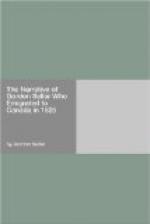On returning to the store at that hour he found Mr Dunlop had been called away, but had left a letter, which he was to deliver. With some difficulty the master found the house. There was a man and woman sitting in the shade on the stoop. Reading the letter he was asked to sit down. The master described the man as short and thin and well up in years, but wiry and active. His wife was comely for her years, with a placid expression. In reply to his first question, the master addressed him as Sir. ’Use not that word again; all men are equal before God; use not the vain distinctions by which so many try to magnify themselves and set themselves apart from their fellows.’ The master was taken aback. The wife explained that they were Friends, whom the world named Quakers, and that their yea and nay meant what they expressed; they desired directness and sincerity in speech. Both took much interest in what the master told them, for they kept questioning him until they learned how he came to leave Scotland and of the voyage. They were struck by his account of the ship grounding off Newfoundland and the wife remarked ‘Thee did well to give thanks to Him who saved you.’ The address of Mr Kerr they asked for, and the master promised to get it. ’He has suffered as we Friends have and still do, for we have no voice in the government of the country and can hold no office.’ A girl came to the door who said supper was ready. The master rose to leave. ’Nay, thee must break bread with us; thee art a stranger in a strange land,’ said the wife, as she took hold of his arm. The evening passed too quickly, for the master enjoyed his company. On rising to go, the Quaker told him he had a block of land he had taken for a bad debt. ’And what is the price you put on it?’ asked the master. ’I do not sell in that way. Thou must see the land and if it suits thee, come back, and I will tell thee its price. Thee take breakfast as early as they can give it, and you will find a man whom we call Jabez waiting to lead thee where the land is.’




